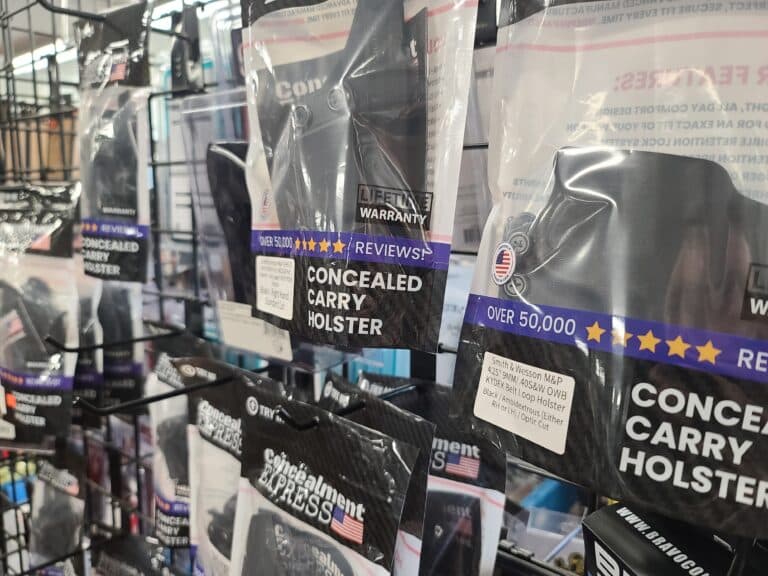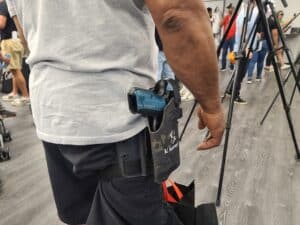The Golden State is back in court over gun-carry permits. This time, the ramifications of the suit could extend well beyond the state’s borders.
A coalition of gun-rights groups led by the California Rifle and Pistol Association (CRPA) filed a new federal lawsuit against the Los Angeles County Sheriff’s Department, La Verne Police Department, and California Attorney General Rob Bonta (D.) on Monday. The suit alleges that each jurisdiction violated the Second Amendment rights of gun-carry permit applicants in different ways.
The primary thrust of the lawsuit is over Los Angeles County’s permit procedures, particularly their application processing times and high fees. It alleges that the Sheriff’s Department often takes 15 months or longer to process applications despite state law specifying a 120-day limit. Meanwhile, the city of La Verne, a municipality within Los Angeles County, charges roughly $1,000 in various fees for carry permit applicants, an amount the groups say makes the city an outlier and is unconstitutionally excessive.
However, the claim against the attorney General is more significant since it may have a nationwide impact. Because California does not issue permits to applicants who live outside the state, and since Bonta has not entered into any reciprocity agreements to recognize licenses issued by authorities in other states, the complaint argues that California is violating the Second Amendment rights of non-residents who have no legal avenue whatsoever to carry a firearm in public for self-defense within the state’s borders.
If plaintiffs win on the Los Angeles County claims the effect would be significant but limited to current county residents. A win on the non-resident claim, however, would open up the potential for residents of the other 49 states to carry for the first time in what routinely ranks in the top 3 most visited states in the country each year. That’s a far more substantial expansion of gun-carry rights in practical terms.
The groups seem to have a solid chance of winning in court. The legal claims raised in the suit are relatively straightforward, considering the fact that they deal with issues that were directly addressed by the Supreme Court in New York State Rifle & Pistol Association v. Bruen. In the same majority opinion striking down subjective may-issue laws like the one California used to have, Justice Clarence Thomas warned government officials against putting objective licensing regimes “toward abusive ends.”
“To be clear, nothing in our analysis should be interpreted to suggest the unconstitutionality of the 43 States’ ‘shall-issue’ licensing regimes, under which ‘a general desire for self-defense is sufficient to obtain a [permit],’” he wrote. “That said, because any permitting scheme can be put toward abusive ends, we do not rule out constitutional challenges to shall-issue regimes where, for example, lengthy wait times in processing license applications or exorbitant fees deny ordinary citizens their right to public carry.”
Of course, an official judicial determination would need to be made on what constitutes a “lengthy wait time” or “exorbitant fees.” But even under the most generous interpretation, processing times spanning almost the entire duration of a carry permit’s validity and fees that climb into the thousands seem likely to fit the bill.
Furthermore, California’s categorical denial of carry rights to certain people based on where in the country they call home seems difficult to square with Bruen‘s core holding recognizing a general right to carry a firearm in public. That’s the view District Court Justice John F. Coffey took when dismissing charges against a New Hampshire man for carrying without a permit in Massachusetts.
“An individual only loses a constitutional right if he commits an offense or is or has been engaged in certain behavior that is covered by 18 USC section 922,” he wrote on August 3rd in Commonwealth of Massachusetts v. Dean F. Donnell. “He doesn’t lose that right simply by traveling into an adjoining state whose statute mandates that residents of that state obtain a license prior to exercising their constitutional right. To hold otherwise would inexplicably treat Second Amendment rights differently than other individually held rights.”
He also found there was “no historical precedent limiting the reach of one’s exercise to a federal constitutional right to only within that resident’s states borders.”
But the exact outcome remains unpredictable, especially since it’s not certain how much federal courts will be willing to micromanage state’s permit requirements. California is currently one of only two states in the entire country that simultaneously does not recognize carry permits from any other state and does not offer any form of non-resident carry permit. Hawaii is the other.
Eight other states–Connecticut, Illinois, Maryland, Massachusetts, New Jersey, New York, Oregon, Rhode Island–and the District of Columbia do not recognize any other state’s permit. But they do offer non-resident carry permits with varying conditions for eligibility.
If their current law is thrown out, California will likely seek to emulate those states since their model would allow the state to retain authority over the application terms for a carry permit while still creating an option for non-residents.
The other model, which the plaintiffs in the case are arguing for, is a form of court-ordered reciprocity agreement binding the state to recognize other states’ legally issued carry permits. The plaintiffs claim that the Supreme Court’s precedent in its Obergefell v. Hodges decision, which held that states must recognize same-sex marriage licenses legally issued in other states, should be adopted here too.
“This holding and its logic, with respect to an unenumerated right, apply just as much to the enumerated right to bear arms, and thus applies equally to CCW permits issued by other states as the Supreme Court instructs that it does to marriage licenses issued by other states,” the complaint reads.
It’s a far more ambitious ask of the judge in the case than simply requiring a non-resident permitting system. It would also undoubtedly be more impactful in terms of who would be eligible to carry when visiting the state in the future and how quickly they could qualify.
Of course, the lawsuit is still in its early stages, and a favorable ruling for gun-rights advocates is not a certainty. Nevertheless, under the direction given to courts by Bruen, it seems likely that in the not-too-distant future, more gun owners could find themselves eligible to legally carry a firearm in California.







2 Responses
Hmmm – to accelerate this, I would like to see Texas, and perhaps Arkansas, and Oklahoma, and Florida, etc pass legislation to not recognize drivers’ licenses form California, Hawaii (small impact, I know), New York, Maryland.
Or, perhaps require out-of-state residents to specifically apply for, pay for a Texas non-resident drivers’ license.
And not recognize vehicle licenses (inspections) from those states, too.
Before you roll your eyes too far back, think of the impact – and the fact that firearms ownership and bearing is a specifically enumerated right (and there are VERY few of those), while driving is an unprotected priveledge.
It is a bit confusing why some state certifications are required to be accepted by other states, but some aren’t. I’ve always been a bit confused about why that is. Perhaps I’ll do a podcast with an expert on that front.